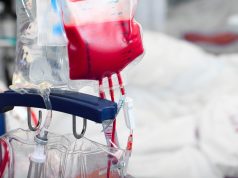Findings in patients with known, suspected coronary artery disease
MONDAY, Oct. 19, 2015 (HealthDay News) — Longer QRS duration predicts cardiac death and nonfatal myocardial infarction (MI) in patients with coronary artery disease, according to a study published in the Nov. 1 issue of The American Journal of Cardiology.
Roy Huurman, from Erasmus Medical Center in the Netherlands, and colleagues investigated the long-term prognostic value of QRS duration in 512 patients (308 men) with known or suspected coronary artery disease who underwent myocardial perfusion imaging (MPI).
The researchers found that over a mean follow-up of 8.6 years, 290 patients died (60 percent), with 27 percent of these deaths attributable to cardiac causes. Twenty-eight patients (6 percent) had nonfatal MI, and 127 patients (25 percent) underwent late coronary revascularization (>three months). The annualized cardiac death rates and cardiac death or nonfatal MI rates were lower in patients with QRS duration <120 ms compared with those with QRS duration of ≥120 ms (2.2 percent and 2.3 percent, respectively, versus 4.1 percent and 4.4 percent, respectively). In multivariate models, QRS duration ≥120 ms was an independent predictor of both end points, in addition to clinical characteristics and MPI results.
“In conclusion, QRS duration ≥120 ms is an independent predictor of cardiac death and cardiac death or nonfatal MI, after adjustment for clinical characteristics and MPI results,” write the authors.
Copyright © 2015 HealthDay. All rights reserved.








